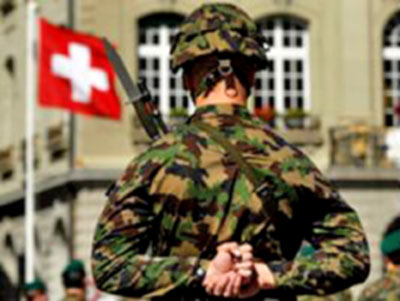
by Matt Clinch
October 15, 2012
from
CNBC Website

With anti-austerity protests across Europe
resulting in civil unrest on the streets of Athens and Madrid, the European
country famed for its neutrality is taking unusual precautions.
Switzerland launched the military exercise "Stabilo
Due" in September to respond to the current instability in Europe and to
test the speed at which its army can be dispatched. The country is not a
member of the union or among the 17 countries that share the euro.
Swiss newspaper Der Sonntag reported
recently that the exercise centered around a risk map created in 2010, where
army staff detailed the threat of internal unrest between warring factions
as well as the possibility of refugees from,
-
Greece
-
Spain
-
Italy
-
France
-
Portugal
The Swiss defense ministry told CNBC that it
does not rule out having to deploy troops in the coming years.
"It's not excluded that the consequences of
the financial crisis in Switzerland can lead to protests and violence,"
a spokesperson told CNBC. "The army must be ready when the police in
such cases requests for subsidiary help."
Some 2,000 troops were part of the drill
exercise in eight different towns across the country. Infantry soldiers were
used as well as the Air Force and special forces personnel in an assignment
that took years to organize.
Quoted in a Schweizer Soldat magazine,
Defense Minister Ueli Maurer warned of an escalation of
violence in Europe.
"I can't exclude that in the coming years we
may need the army," he said.
According to the minister, under pressure to
save, some European countries
didn't renew their armies as they could no longer afford the
upkeep of modern systems.
He said that the situation could amplify dramatically, with countries that
couldn't defend themselves facing the possibility of "blackmail." In the
paper, he also asked how long the crisis could be calmed with money alone.
Der Sonntag newspaper also reported that army chief André
Blattmann is set to submit a proposal in December to utilize four
battalions of military police. This will consist of 1,600 soldiers guarding
strategic points in the country including the airport, industrial plants,
and the international organizations in Geneva.
Protests have taken place in numerous European cities since the
financial crisis hit the continent in 2008. In September, 70,000 people
marched to the Greek Parliament in Athens and the protests ended with
demonstrators clashing with police.
Last week, at least 7,000 plainclothes police and hundreds more undercover
agents were mobilized to lock down Athens.
Snipers, commandos, frogmen, and helicopters
were also present as German Chancellor Angela Merkel
visited the country and thousands of protesters streamed into
Syntagma square.
A Reason to Exist?
The military is a hot topic in Switzerland,
which has mandatory military service.
Under Swiss law, all able-bodied men at age 19
have to undergo five months of training, followed by refresher courses of
several weeks over the next decade.
A referendum is likely to take place next year to decide the fate of this
conscription policy. The current number of recruits stands at 200,000 - the
biggest army in Europe relative to population size.
Josef Lang, the vice president of the
Swiss Green Party and leader of the country's pacifist movement, told
CNBC that the defense ministry was using the euro zone crisis for
political purposes ahead of this key vote.
"They're using social unrest and instability
in Europe to give more credibility to the army," he said.
"Switzerland for many years has never fought
anyone else. This is what we call in Switzerland interior actions -
actions by the Swiss army against their own citizens. There is a long
history of this in Switzerland."
Lang added that he didn't believe the streets of
Switzerland would see the unrest that has been seen in Spain or Greece.
GSOA, a group working to reduce the military
activities of Switzerland, had similar thoughts.
"The Swiss army is looking desperately for a
reason to exist, this is why they always try to find new tasks," a
spokesperson said.
"There are some very small groups which like
smashing up windows, but this happens only two or three times per year
and the police can handle it more or less well."
One former soldier in the Swiss army told CNBC
that his superiors would often ask him to use ammunition liberally in
training scenarios.
"That meant:
'Use up everything, have fun, if we
don't use it all up they're going to think we need less and cut the
budget'," he told CNBC.com.
"Sometimes they make up a kind of alternate
Europe with made-up countries and stuff, just to give a frame for tactic
games and exercises."

